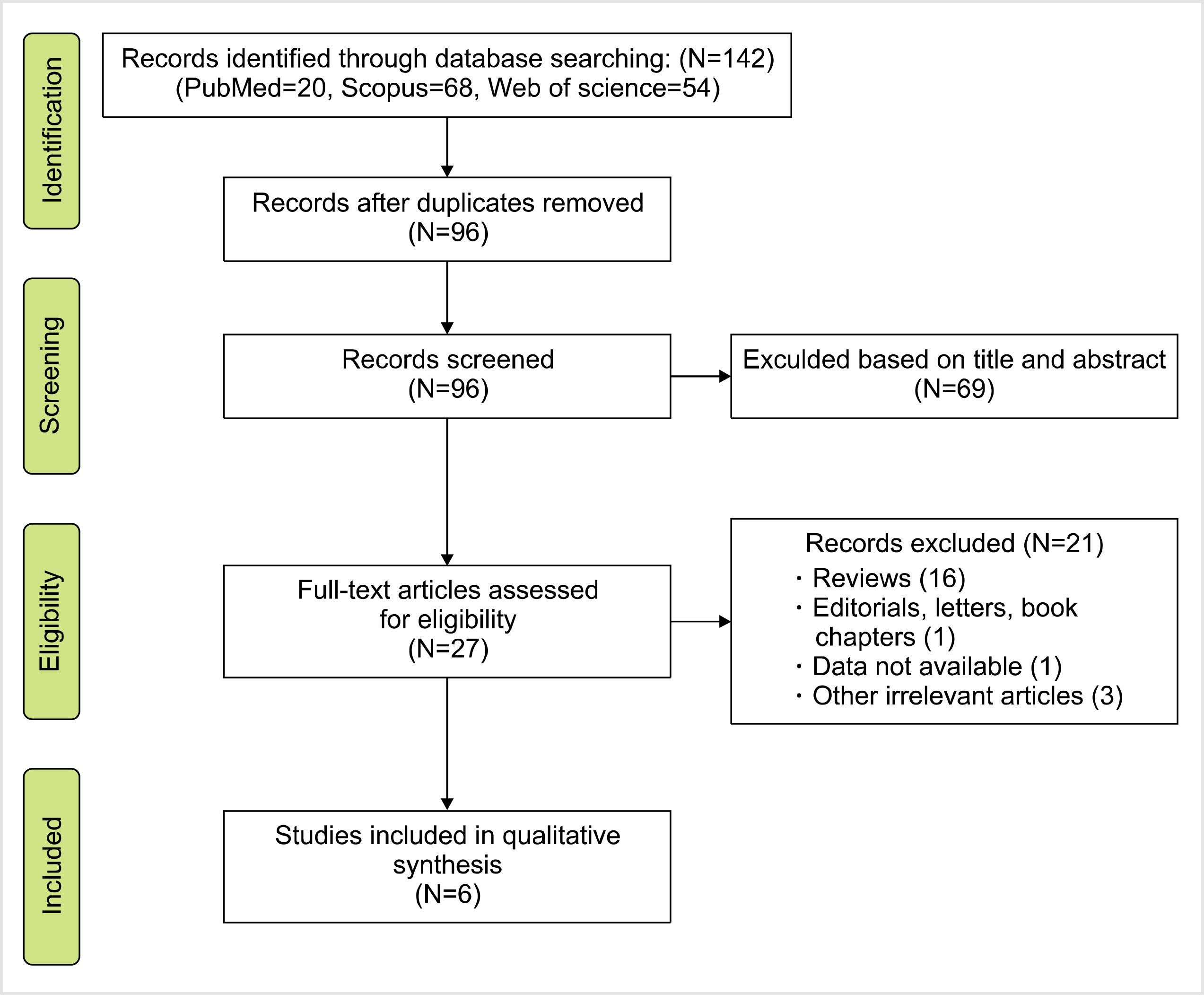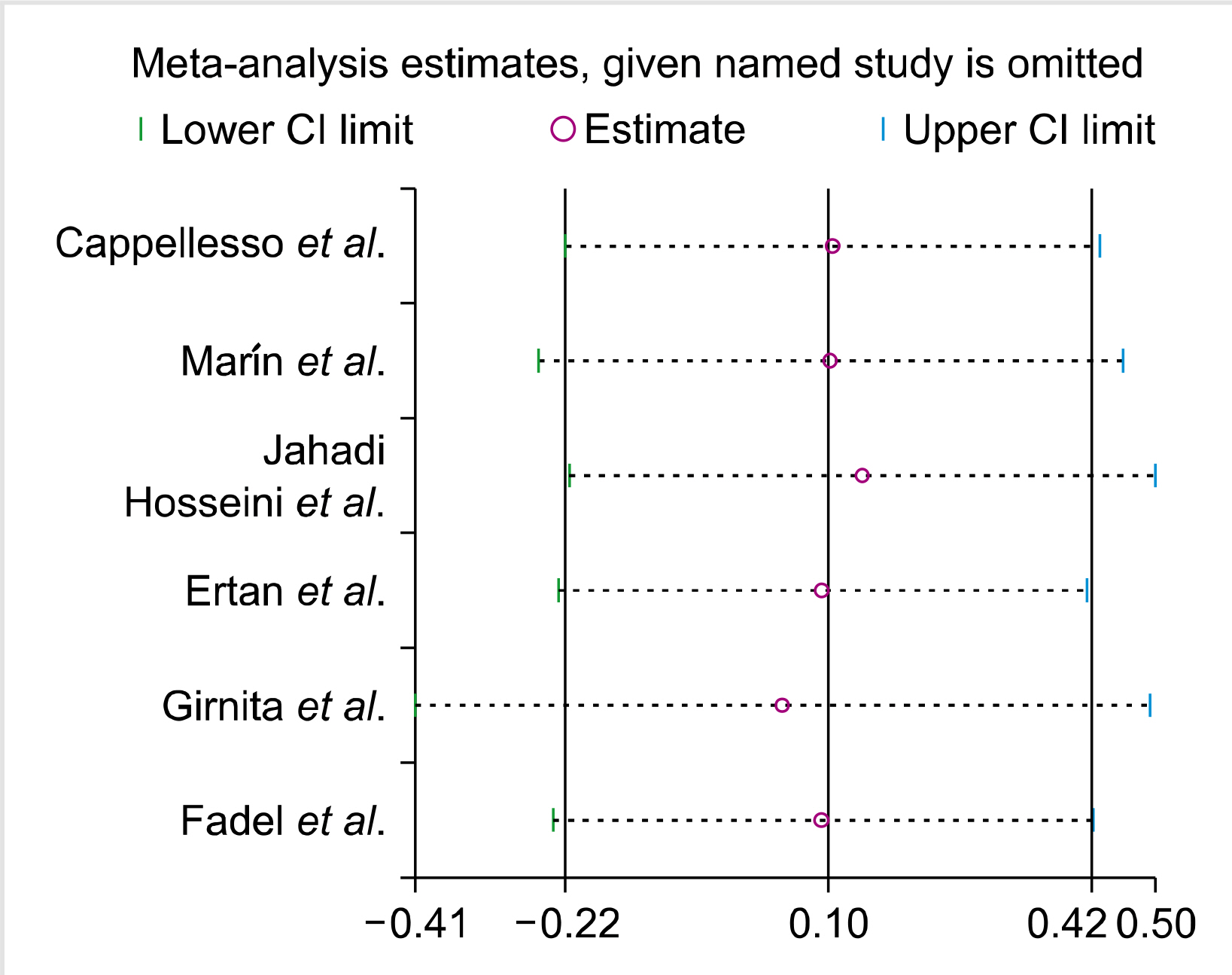Blood Res.
2021 Mar;56(1):17-25. 10.5045/br.2021.2020201.
FAS-670A>G gene polymorphism and the risk of allograft rejection after organ transplantation: a systematic review and meta-analysis
- Affiliations
-
- 1Department of Hematology, Faculty of Medical Sciences, Tarbiat Modares University, Tehran, Iran
- 2Department of Immunology, School of Medicine, Shahid Beheshti University of Medical Sciences, Sari, Iran.
- 3Mazandaran Faculty of Paramedical Sciences, Mazandaran University of Medical Sciences, Sari, Iran.
- 4Department of Medical Parasitology and Mycology, School of Public Health, Tehran, Iran.
- 5Hematology-Oncology and Stem Cell Transplantation Research Center, Tehran University of Medical Sciences, Tehran, Iran.
- KMID: 2514060
- DOI: http://doi.org/10.5045/br.2021.2020201
Abstract
- The association between the risk of allograft rejection after organ transplantation and FAS gene polymorphism has been evaluated previously. However, inconsistent results have been reported. Hence, we conducted the most up-to-date meta-analysis to evaluate this association. All eligible studies reporting the association between FAS-670A>G polymorphism and the risk of allograft rejection published up to December 2019 were extracted using a comprehensive systematic database search in the Web of Science, Scopus, and PubMed. The pooled odds ratios (OR) and corresponding 95% confidence intervals (CI) were calculated to determine the association strength. This meta-analysis included six case-control studies with 277 patients who experienced allograft rejection and 1,001 patients who did not experience allograft rejection (controls) after organ transplantation. The overall results showed no significant association between FAS-670A>G polymorphism and the risk of allograft rejection in five genetic models (dominant model: OR=0.81, 95% CI=0.58‒1.12; recessive model: OR=0.10, 95% CI=0.80‒1.53; allelic model: OR=0.96, 95% CI=0.79‒1.18; GG vs. AA: OR=0.92, 95% CI=0.62‒1.36; and AG vs. AA: OR=0.75, 95% CI=0.52‒1.08). Moreover, subgroup analysis according to ethnicity and age did not reveal statistically significant results. Our findings suggest that FAS-670A>G polymorphism is not associated with the risk of allograft rejection after organ transplantation.
Keyword
Figure
Reference
-
1. Black CK, Termanini KM, Aguirre O, Hawksworth JS, Sosin M. 2018; Solid organ transplantation in the 21 st century. Ann Transl Med. 6:409. DOI: 10.21037/atm.2018.09.68. PMID: 30498736. PMCID: PMC6230860.2. Ruiz P, Maldonado P, Hidalgo Y, et al. 2013; Transplant tolerance: new insights and strategies for long-term allograft acceptance. Clin Dev Immunol. 2013:210506. DOI: 10.1155/2013/210506. PMID: 23762087. PMCID: PMC3665173.
Article3. Benvenuto LJ, Anderson MR, Arcasoy SM. 2018; New frontiers in immunosuppression. J Thorac Dis. 10:3141–55. DOI: 10.21037/jtd.2018.04.79. PMID: 29997983. PMCID: PMC6006112.
Article4. Zavazava N, Kabelitz D. 2000; Alloreactivity and apoptosis in graft rejection and transplantation tolerance. J Leukoc Biol. 68:167–74. PMID: 10947059.5. Nwakoby IE, Reddy K, Patel P, et al. 2001; Fas-mediated apoptosis of neutrophils in sera of patients with infection. Infect Immun. 69:3343–9. DOI: 10.1128/IAI.69.5.3343-3349.2001. PMID: 11292757. PMCID: PMC98293.
Article6. Martinez OM, Krams SM. 1999; Involvement of Fas-Fas ligand interactions in graft rejection. Int Rev Immunol. 18:527–46. DOI: 10.3109/08830189909088497. PMID: 10672500.
Article7. Singh R, Pradhan V, Patwardhan M, Ghosh K. 2009; APO-1/Fas gene: structural and functional characteristics in systemic lupus erythematosus and other autoimmune diseases. Indian J Hum Genet. 15:98–102. DOI: 10.4103/0971-6866.60184. PMID: 21088713. PMCID: PMC2922636.
Article8. Xing Y, Hogquist KA. 2012; T-cell tolerance: central and peripheral. Cold Spring Harb Perspect Biol. 4:a006957. DOI: 10.1101/cshperspect.a006957. PMID: 22661634. PMCID: PMC3367546.
Article9. Chávez-Galán L, Arenas-Del Angel MC, Zenteno E, Chávez R, Lascurain R. 2009; Cell death mechanisms induced by cytotoxic lymphocytes. Cell Mol Immunol. 6:15–25. DOI: 10.1038/cmi.2009.3. PMID: 19254476. PMCID: PMC4002546.
Article10. Priante G, Gianesello L, Ceol M, Del Prete D, Anglani F. 2019; Cell death in the kidney. Int J Mol Sci. 20:3598. DOI: 10.3390/ijms20143598. PMID: 31340541. PMCID: PMC6679187.
Article11. Tannapfel A, Kohlhaw K, Ebelt J, et al. 1999; Apoptosis and the expression of Fas and Fas ligand (FasL) antigen in rejection and reinfection in liver allograft specimens. Transplantation. 67:1079–83. DOI: 10.1097/00007890-199904150-00027. PMID: 10221500.
Article12. Crispe IN. 2003; Hepatic T cells and liver tolerance. Nat Rev Immunol. 3:51–62. DOI: 10.1038/nri981. PMID: 12511875.
Article13. Nunobiki O, Ueda M, Toji E, et al. 2011; Genetic polymorphism of cancer susceptibility genes and HPV infection in cervical carcinogenesis. Patholog Res Int. 2011:364069. DOI: 10.4061/2011/364069. PMID: 21660264. PMCID: PMC3108378.
Article14. Huang QR, Morris D, Manolios N. 1997; Identification and character-ization of polymorphisms in the promoter region of the human Apo-1/Fas (CD95) gene. Mol Immunol. 34:577–82. DOI: 10.1016/S0161-5890(97)00081-3. PMID: 9393960.15. Sibley K, Rollinson S, Allan JM, et al. 2003; Functional FAS promoter polymorphisms are associated with increased risk of acute myeloid leukemia. Cancer Res. 63:4327–30. PMID: 12907599.16. Ertan P, Mir S, Ozkayin N, Berdeli A. 2010; Association of FAS -670A/G and FASL -843C/T gene polymorphisms on allograft nephropathy in pediatric renal transplant patients. Iran J Pediatr. 20:442–50. PMID: 23056744. PMCID: PMC3446084.17. Moher D, Liberati A, Tetzlaff J, Altman DG. PRISMA Group. 2010; Preferred reporting items for systematic reviews and meta-analyses: the PRISMA statement. Int J Surg. 8:336–41. DOI: 10.1016/j.ijsu.2010.02.007. PMID: 20171303.
Article18. Stang A. 2010; Critical evaluation of the Newcastle-Ottawa scale for the assessment of the quality of nonrandomized studies in meta-analyses. Eur J Epidemiol. 25:603–5. DOI: 10.1007/s10654-010-9491-z. PMID: 20652370.
Article19. Huedo-Medina TB, Sánchez-Meca J, Marín-Martínez F, Botella J. 2006; Assessing heterogeneity in meta-analysis: Q statistic or I2 index? Psychol Methods. 11:193–206. DOI: 10.1037/1082-989X.11.2.193. PMID: 16784338.20. DerSimonian R, Laird N. 1986; Meta-analysis in clinical trials. Control Clin Trials. 7:177–88. DOI: 10.1016/0197-2456(86)90046-2. PMID: 3802833.
Article21. Mantel N, Haenszel W. 1959; Statistical aspects of the analysis of data from retrospective studies of disease. J Natl Cancer Inst. 22:719–48. PMID: 13655060.22. Begg CB, Mazumdar M. 1994; Operating characteristics of a rank correlation test for publication bias. Biometrics. 50:1088–101. DOI: 10.2307/2533446. PMID: 7786990.
Article23. Egger M, Davey Smith G, Schneider M, Minder C. 1997; Bias in meta-analysis detected by a simple, graphical test. BMJ. 315:629–34. DOI: 10.1136/bmj.315.7109.629. PMID: 9310563. PMCID: PMC2127453.
Article24. Cappellesso S, Valentin JF, Al-Najjar A, et al. 2002; Recipient TNFRSF6 (FAS) gene polymorphism and acute renal allograft rejection. Transplant Proc. 34:803–4. DOI: 10.1016/S0041-1345(01)02916-5. PMID: 12034188.
Article25. Marín LA, Muro M, Moya-Quiles MR, et al. 2006; Study of Fas (CD95) and FasL (CD178) polymorphisms in liver transplant recipients. Tissue Antigens. 67:117–26. DOI: 10.1111/j.1399-0039.2006.00538.x. PMID: 16441482.
Article26. Jahadi Hosseini HR, Kamali Sarvestani E, Akbari M, Mosallaei M. 2009; Effect of Fas-670 A/G gene polymorphism on corneal allograft endothelial rejection. Iran J Immunol. 6:28–32. PMID: 19293475.27. Girnita DM, Ohmann EL, Brooks MM, et al. 2011; Gene polymorphisms impact the risk of rejection with hemodynamic compromise: a multicenter study. Transplantation. 91:1326–32. DOI: 10.1097/TP.0b013e31821c1e10. PMID: 21659963.
Article28. Fadel FI, Elshamaa MF, Salah A, et al. 2016; Fas/Fas Ligand pathways gene polymorphisms in pediatric renal allograft rejection. Transpl Immunol. 37:28–34. DOI: 10.1016/j.trim.2016.04.006. PMID: 27109035.
Article29. Elmore S. 2007; Apoptosis: a review of programmed cell death. Toxicol Pathol. 35:495–516. DOI: 10.1080/01926230701320337. PMID: 17562483. PMCID: PMC2117903.
Article30. Carroll HP, Ali S, Kirby JA. 2001; Accelerating the induction of Fas-mediated T cell apoptosis: a strategy for transplant tolerance? Clin Exp Immunol. 126:589–97. DOI: 10.1046/j.1365-2249.2001.01706.x. PMID: 11737081. PMCID: PMC1906223.
Article31. Klemke CD, Brenner D, Weiss EM, et al. 2009; Lack of T-cell receptor-induced signaling is crucial for CD95 ligand up-regulation and protects cutaneous T-cell lymphoma cells from activation-induced cell death. Cancer Res. 69:4175–83. DOI: 10.1158/0008-5472.CAN-08-4631. PMID: 19435902.
Article32. Boix F, Millan O, San Segundo D, et al. 2016; High expression of CD38, CD69, CD95 and CD154 biomarkers in cultured peripheral T lymphocytes correlates with an increased risk of acute rejection in liver allograft recipients. Immunobiology. 221:595–603. DOI: 10.1016/j.imbio.2016.01.008. PMID: 26850323.
Article33. Mancebo E, Castro MJ, Allende LM, et al. 2016; High proportion of CD95(+) and CD38(+) in cultured CD8(+) T cells predicts acute rejection and infection, respectively, in kidney recipients. Transpl Immunol. 34:33–41. DOI: 10.1016/j.trim.2016.01.001. PMID: 26773856.
Article34. Wang YL, Zhang YY, Li G, et al. 2005; Correlation of CD95 and soluble CD95 expression with acute rejection status of liver trans-plantation. World J Gastroenterol. 11:1700–4. DOI: 10.3748/wjg.v11.i11.1700. PMID: 15786554. PMCID: PMC4305958.
Article35. Kanemitsu S, Ihara K, Saifddin A, et al. 2002; A functional polymo-rphism in fas (CD95/APO-1) gene promoter associated with systemic lupus erythematosus. J Rheumatol. 29:1183–8. PMID: 12064832.36. Farre L, Bittencourt AL, Silva-Santos G, et al. 2008; Fas 670 promoter polymorphism is associated to susceptibility, clinical pre-sentation, and survival in adult T cell leukemia. J Leukoc Biol. 83:220–2. DOI: 10.1189/jlb.0407198. PMID: 17962369.37. Razi B, Alizadeh S, Imani D, Rezaei R, Omidkhoda A. 2017; Interferon-gamma +874 (T/A) polymorphism and susceptibility to aplastic anemia: a systematic review and meta-analysis. Evid Based Med Pract. 3:1000112. DOI: 10.4172/2471-9919.1000112.
Article38. Ding YW, Pan SY, Xie W, Shen HY, Wang HH. 2018; Elevated soluble Fas and FasL in cerebrospinal fluid and serum of patients with anti-N-methyl-D-aspartate receptor encephalitis. Front Neurol. 9:904. DOI: 10.3389/fneur.2018.00904. PMID: 30410466. PMCID: PMC6209679.
Article39. Pérez EC, Shulzhenko N, Morgun A, et al. 2006; Expression of Fas, FasL, and soluble Fas mRNA in endomyocardial biopsies of human cardiac allografts. Hum Immunol. 67:22–6. DOI: 10.1016/j.humimm.2006.02.037. PMID: 16698421.
Article40. Papoff G, Cascino I, Eramo A, Starace G, Lynch DH, Ruberti G. 1996; An N-terminal domain shared by Fas/Apo-1 (CD95) soluble variants prevents cell death in vitro. J Immunol. 156:4622–30. PMID: 8648105.41. Adachi K, Fujino M, Kitazawa Y, et al. 2006; Exogenous expression of Fas-ligand or CrmA prolongs the survival in rat liver transplantation. Transplant Proc. 38:2710–3. DOI: 10.1016/j.transproceed.2006.08.011. PMID: 17098047.
Article42. Ortiz A. 2000; Nephrology forum: apoptotic regulatory proteins in renal injury. Kidney Int. 58:467–85. DOI: 10.1046/j.1523-1755.2000.00188.x. PMID: 10886604.43. Liem LM, van Lopik T, van Nieuwenhuijze AE, van Houwelingen HC, Aarden L, Goulmy E. 1998; Soluble Fas levels in sera of bone marrow transplantation recipients are increased during acute graft-versus-host disease but not during infections. Blood. 91:1464–8. DOI: 10.1182/blood.V91.4.1464. PMID: 9454779.
Article44. Nishioka T, Minami T, Matsumoto S, et al. 2000; Soluble FAS in renal allograft recipients. Transplant Proc. 32:1784. DOI: 10.1016/S0041-1345(00)01375-0. PMID: 11119935.
Article45. Rivero M, Crespo J, Mayorga M, Fábrega E, Casafont F, Pons-Romero F. 2002; Involvement of the Fas system in liver allograft rejection. Am J Gastroenterol. 97:1501–6. DOI: 10.1111/j.1572-0241.2002.05797.x. PMID: 12094873.
Article46. Wang T, Dong C, Stevenson SC, et al. 2002; Overexpression of soluble FAS attenuates transplant arteriosclerosis in rat aortic allografts. Circulation. 106:1536–42. DOI: 10.1161/01.CIR.0000027822.23269.07. PMID: 12234961.
Article47. Mahfoudh W, Bel Hadj ad B Jr, Romdhane A, Chouchane L. 2007; A polymorphism in FAS gene promoter correlated with circulating soluble FAS levels. Int J Immunogenet. 34:209–12. DOI: 10.1111/j.1744-313X.2007.00676.x. PMID: 17504511.
Article
- Full Text Links
- Actions
-
Cited
- CITED
-
- Close
- Share
- Similar articles
-
- Interleukin-10 polymorphism (-1082, G/A) on acute rejection risk in solid organ transplant recipients in a Caucasian population: a meta-analysis
- Chronic Rejection after Lung Transplantation
- Macrophages in xenotransplantation
- Medical Complications of Lung Transplantation
- A Retrospective Analysis on Reasons for Allograft Nephrectomy after Kidney Transplantation








